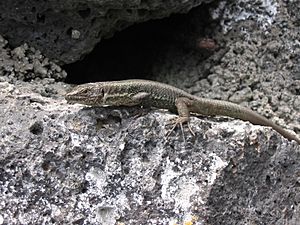Madeiran wall lizard facts for kids
Quick facts for kids Madeira wall lizard |
|
|---|---|
 |
|
| Teira dugesii in the São Jorge Island, Azores | |
| Conservation status | |
| Scientific classification | |
| Kingdom: | |
| Phylum: | |
| Class: | |
| Order: | |
| Suborder: | |
| Family: |
Lacertidae
|
| Genus: |
Teira
|
| Species: |
T. dugesii
|
| Binomial name | |
| Teira dugesii (Milne-Edwards, 1829)
|
|
| Synonyms | |
|
|
The Madeira wall lizard (Teira dugesii) or Madeira lizard is a species of lizard in the Lacertidae family, and the only member of the genus Teira.
Distribution
This Madeira wall lizard is endemic to the Madeira Islands, Portugal, where it is abundant. In the Azores, this lizard is found after involuntary introduction during the 19th century by ship trade between the two archipelagos, but the lizards have never reached the population numbers as in their territory of origin. There is also a small population in the port area of Lisbon, probably accidentally transported in ships carrying bananas, and first found in 1992; a study of 2001 found that the population has remained stable in size since its discovery.
Taxonomy
The species was named after the French zoologist Louis Antoine Dugès (1797–1838).
The subspecies Teira dugesii mauli (Mertens, 1938) from the Desertas Islands now is a synonym of Teira dugesii dugesii. Atlantolacerta andreanskyi (Andreansky's lizard) from Morocco, and Scelarcis perspicillata (Menorca wall lizard) from Morocco, Algeria and Minorca, were in the genus Teira but now are in other genera.
The species Teira dugessii presents three subspecies:
- Teira dugesii dugesii (Milne-Edwards, 1829) - of the Madeira island and of the Desertas Islands (Deserta Grande, Ilhéu Chão e Bugio). The population introduced in Azores and Lisbon are of this subspecie.
- Teira dugesii jogeri (Bischoff, Osenegg & Mayer, 1989) - of the Porto Santo island.
- Teira dugesii selvagensis (Bischoff, Osenegg & Mayer, 1989) of the Selvagens islands.
Characteristics
These lizards can reach 20 cm (7.9 in) in length, although adults have usually between 10 and 15 cm (3.9 and 5.9 in). Their color can vary from light brown to dark gray, but with some of them (usually males) may show other colors, like green, blue and violet. Males can be easily distinguished from females due to the presence of a yellow fold at the bottom of the hind legs.
The females lay two to three groups of eggs annually. And some individuals could live to 16 years or more.
Food
Despite being essentially an insectivorous species, ripe fruits and berries (especially blackberries) are also part of their diet.
Habitat
This species is generally found in arid areas where the vegetation is not dense. It may also occur in open woodland, areas with rocks and where crops are grown.
Images for kids
See also
 In Spanish: Lagartija de Madeira para niños
In Spanish: Lagartija de Madeira para niños




